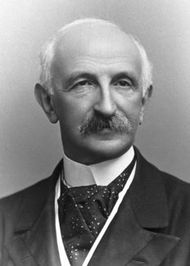
1893: Origins of the HCCH
The origins of private international law as a discipline can be traced back to the Renaissance, as new questions on the interaction between different legal systems arose with the expansion of trade between the Northern Italian city-states. However, it is not until the end of the 19th century that a group of prominent international lawyers, most notable among them Pasquale Mancini and T.M.C. Asser, paved the way for States to establish a uniform system, based on cooperation and mutual respect, for resolving issues related to the cross-border application of laws and recognition of judgments.
In 1893, at the behest of T.M.C. Asser, the Dutch Government convened an international conference on the regulation of a number of issues relating to civil procedure and jurisdiction. Attended by delegates from 13 States, this “Hague Conference” has since then become known as the First Session of the Hague Conference. The first “Hague Convention”, the Convention on Civil Procedure, was adopted shortly after, in 1894, and signed on 14 November 1896.
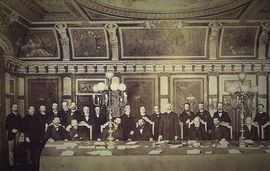
1893-1949: Initial sessions of the Hague Conference
The first six Sessions of the Hague Conference were held between 1893 and 1928. These were international conferences organised on an ad hoc basis with the participation of a limited number of States, varying from 13 to 22. The first decade of the Hague Conference’s history (1893-1904) was characterised by significant progress, as its first four Sessions resulted in the adoption of no less than six Conventions - all except one in the field of family law. Many of these “old Conventions” have since been replaced, in whole or in part, by more modern instruments.
With the outbreak of the two world wars international cooperation broke down, and progress in the unification of private international law came to a standstill. While the fifth and sixth Hague Conferences were held in the interwar period (in 1925 and 1928 respectively), these did not lead to the adoption of any new Conventions.
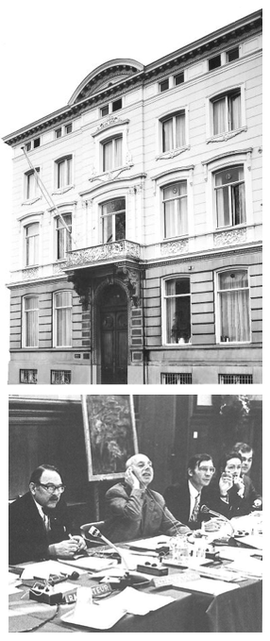
1950s-1970s: Revival and establishment of the HCCH as a permanent organisation
The end of the Second World War marked the start of a new era for the Hague Conference. After a long hiatus, its seventh Session was held in 1951, resulting in the adoption of a Statute which, upon its entry into force on 15 July 1955, would establish the Hague Conference as a permanent intergovernmental organisation, governed by its Members and supported by a secretariat, the Permanent Bureau.
The Statute enshrined the practice of designating National Organs to facilitate communications with the Permanent Bureau and other Members. These would later be complemented by Central Authorities, the entities designated by Contracting Parties to coordinate national implementation of their respective Convention. First introduced with the 1965 Service and 1970 Evidence Conventions, Central Authorities have been incorporated into most HCCH instruments adopted since.
At its inception, the official language of the HCCH was French, which remained the sole official language until 1964, when English was adopted as the second official language. This facilitated the participation of more States with a common law tradition, such as the United States, Canada and, later, Australia, as the HCCH sought to build bridges between civil law and common law systems.
During the post-war period increases in migration and trade placed pressure on traditional diplomatic and consular services, which resulted in greater attention being afforded to issues of private international law. The concepts of habitual residence and party autonomy are first introduced, becoming central features of subsequent private international law instruments. It was also during this period that the 1961 Apostille Convention, the most successful HCCH Convention to date, was adopted.
In 1977, the first ever Special Commission on the practical operation of an HCCH Convention was convened to discuss the Service Convention, marking the beginning of what would become the post-Convention work of the HCCH, a fundamental element of its operations today. A second Special Commission meeting was held in 1978 to discuss the Evidence Convention.
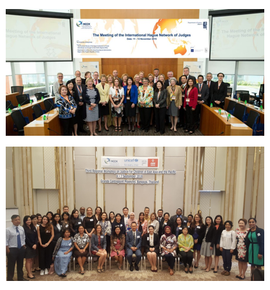
1980s-1990s
The expansion of the HCCH accelerated throughout the 1980s and 1990s, its Membership growing from 27 to 47 States. The majority of these new Members were States in Eastern Europe, Latin America, Asia and the Middle East. This was a reflection of the increased interest in HCCH Conventions from across the globe and was an important part of the Organisation’s transformation into a global intergovernmental organisation.
The establishment of the four modern HCCH Conventions relating to children is another major development of this period. The Child Abduction Convention was adopted in 1980, followed by the Adoption Convention in 1993 and the Child Protection Convention in 1996. Although the Child Support Convention and its Protocol were only adopted in 2007, the preparatory work began in the 1990s with the formal review of the existing HCCH Maintenance Conventions at the Special Commission meetings of November 1995 and April 1999.
The provision of post-Convention services and assistance continued to grow in prominence throughout the 1980s and 1990s. The practice of holding Special Commissions on the practical operation of certain Conventions expanded to the family and child protection area, with the organisation of the first (1989), second (1993) and third (1997) meetings of the Special Commission on the 1980 Child Abduction Convention and the first meeting (1994) of the Special Commission on the 1993 Adoption Convention.
In 1998, the International Hague Network of Judges was established to promote direct judicial cooperation and communication in the effective interpretation and implementation of the Children’s Conventions.

1996: Hans van Loon appointed Secretary General
In 1996, Hans van Loon was appointed Secretary General of the HCCH, succeeding Georges Droz in this position. Having first joined the Organisation in 1978, Mr van Loon served as Secretary General for almost 17 years, from 1996 to 2013. During his tenure, Mr van Loon presided over a period of remarkable expansion as the Organisation grew from 44 to 74 Members. In this time, nine HCCH Conventions were also adopted and the Statute of the Organisation was revised.
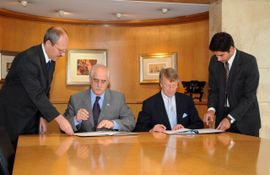
2005: Establishment of the Regional Office for Latin America and the Caribbean
In response to increasing demand in Latin America, in 2005 the HCCH Permanent Bureau established a Special Programme for Latin American States. Following the success of the Special Programme, and with the generous support of the Argentinian Government, a Regional Office for Latin America was established in Buenos Aires, Argentina. In 2017, the Council on General Affairs and Policy (CGAP) approved the extension of the Regional Office’s geographical mandate to include the Caribbean, and in doing so approved the corresponding name change to Regional Office for Latin America and the Caribbean (ROLAC).
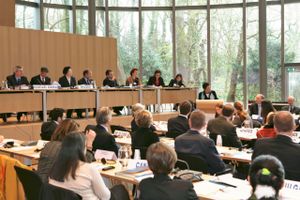
2007: Revision of HCCH Statute and EU Membership
On 1 January 2007, a revised version of the Statute of the HCCH entered into force, enabling Regional Economic Integration Organisations to become Members of the Organisation. Shortly after, on 3 April 2007, the Council on General Affairs and Policy of the HCCH unanimously decided to admit the European Community as its first Member Organisation. The admission of the European Community, formerly an observer, complemented its individual Members States, which continue to be HCCH Members in their own right. With the entry into force of the Treaty of Lisbon on 1 December 2009, the European Union replaced and succeeded the European Community as HCCH Member.
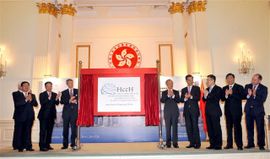
2012: Establishment of the Regional Office for Asia and the Pacific
Following the success of the HCCH’s first Regional Office, in 2009 Members embarked upon a consultation process on the possible development of a second Regional Office in the Asia-Pacific region. In April 2012, CGAP endorsed the establishment of the Regional Office for Asia and the Pacific (ROAP), to be based in the Hong Kong Special Administrative Region of the People’s Republic of China. ROAP officially opened in December 2012, through the generous support of the Government of the People’s Republic of China.
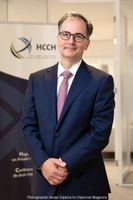
2013: Christophe Bernasconi appointed Secretary General
In 2013, Christophe Bernasconi was appointed Secretary General of the HCCH, upon the retirement of Hans van Loon. Dr Bernasconi, of Swiss nationality, first joined the HCCH in 1997 as Secretary, became First Secretary in 2000 and then Deputy Secretary General in 2011. In 2018, he was reappointed for a further term of five years as Secretary General. To date, Dr Bernasconi has presided over the Organisation’s expansion from 74 to 90 Members, as well as the adoption of the 2019 Judgments Convention and the HCCH Principles. He was the architect of the electronic Apostille Programme (e-APP), which has become an integral part of the modern operation of the Apostille Convention.

2015: Approval of the HCCH Principles
On 19 March 2015, the HCCH formally approved its first soft-law instrument, the Principles on Choice of Law in International Commercial Contracts. The HCCH Principles affirm party autonomy as a basis for the choice of law in international commercial contracts and thereby strengthen legal certainty and predictability in such international transactions.

2018: 125th Anniversary of the HCCH
On 12 September 2018, the HCCH celebrated its 125th anniversary. To mark this occasion, several special events were held throughout the year, including a commemorative ceremony in The Hague attended by dignitaries including His Royal Highness King Willem-Alexander. The anniversary was also celebrated with conferences hosted by the Regional Offices in both Buenos Aires and Hong Kong.

2019: Adoption of the HCCH Judgments Convention
The most recent among the HCCH’s Conventions and instruments, the Judgments Convention was adopted at the Twenty-Second Session of the HCCH on 2 July 2019. Negotiated by over 400 delegates from around the world, the Convention facilitates the recognition and enforcement of foreign judgments in civil or commercial matters, reducing risks and costs associated with cross-border interactions and dispute resolution and seeking to promote global access to justice.